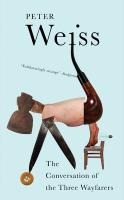Conversation of the Three Wayfarers is a tale overheard, rather than told directly. Abel, Babel, and Cabel, the wayfarers, carry on a three-sided monologue, each reporting curious incidents-the effect is of three capers rolled into one: a steeplechase performed on a floating pontoon. But are they really three distinct individuals? Why do their lives blend in such a fantastic manner? Weiss's strikingly original prose has an impossibly contained quality, with each sentence doing a perfect double-double backflip before neatly landing. This essential rediscovered work, from the masterful and acclaimed German modernist Peter Weiss, will be a delightful discovery for readers of Kafka, Musil, and Gombrowicz.


